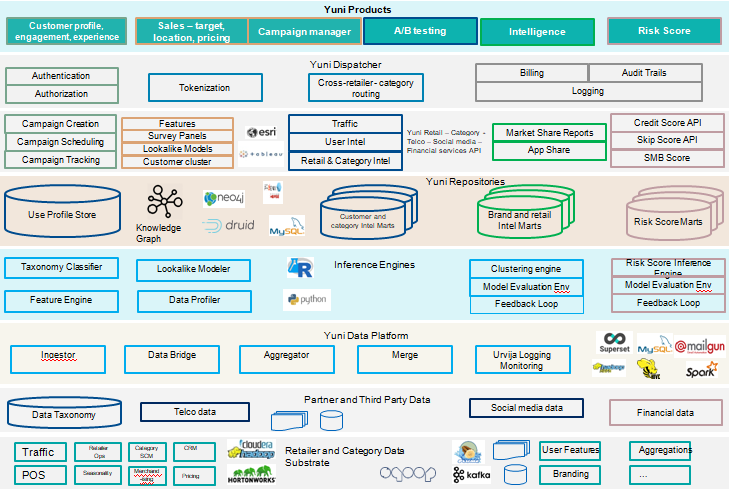A shift from the analog to the digital world for businesses has highlighted the importance of collection, storing and monetisation of data. While data monetisation is hugely associated with the digital businesses, Bengaluru-based Urvija AI is aimed at helping its clients find an additional source of income by monetising the data of the physical world.

[L to R] Urvija Srivastava, Akansha Saxena and Siphie Kala. Credit: Urvija AI
Urvija AI was launched in July 2019 by Urvija Srivastava, along with her father Saurabh Srivastava (former McKenzie consultant ), Akansha Saxena, and Siphie Kala (former employee at McKinsey) . The startup’s core product YUNI, an eight-layer B2B AI platform, generates 10 product families including revenue enhancement, scores and indices, campaigns, surveys, existing customer experience, new customer acquisition, recommendation engine, churn management, productivity, and business intelligence to the client organisations.
It provides clients with tools to analyse data and save internal costs. It also monetises the data collected by sharing the output with third parties.
The idea for the startup was conceptualised by Urvija while she was pursuing her BSc from the University of Nottingham. During her conversation with her father and Akansha, Urvija's cousin sister, they realised that though data is the new oil, most of the monetisation takes place in the digital world, with there being a gap in analysing and understanding the data from the physical world.
“During our conversations, we thought that if we can try and monetise data from the physical world, both internally and externally, it could lead to an additional stream of income for businesses in operations such as manufacturing or supply chain, “ Urvija told YourStory.
Monetising real-world data
Citing an example, Urvija explained that in case of a car manufacturer, the organisation is tracking and monetising data about the customers online, but data points about the manufacturing process, machinery, etc are not being monetised. Urvija AI’s YUNI enables businesses to monetise these data points.
She explains that this model will also prove to be a stable mode of additional income for the businesses as data flow is always available.
“We have a unique product architecture which works across several data sources and generates diverse product families. We provide more than 750 products under the families which have been divided into three categories,” Akansha explains.
“The first group includes internal products which solve problems related to customer acquisition, customer experience, and company revenue among others. The second comprises the external products which form 60 percent of our offering and helps us generate money from third parties, taking care of data related to intelligence. The third is the product on the collaboration curve where we work with our data holders to bring various data sets together and benefit mutually. For example, brick and mortar retailers, driving ecommerce consumer behaviour, healthcare, manufacturing, logistics and transportation,” she adds.
While the co-founders declined to reveal details about their clients, they claimed that Urvija AI’s YUNI products are used by businesses across sectors including telecom, banking, consumer goods, retail, insurance, industrial operations, healthcare, education, satellite, logistics, and transportation.

Credit: Urvija AI
Business and plans
Currently, Urvija AI’s business is present across India, Thailand, South Africa, and Canada. Speaking about the business model, Saurabh, business advisor for Urvija AI, explains that it follows a 50 percent revenue-sharing model. “We give our products for free with no upfront costs, and work completely on a revenue-sharing model,” he adds.
According to Urvija, the startup clocked in Rs 300-500 crore revenue at the end of this financial year, and has orders booked worth $500 million (approx. Rs 3,700 crore) over a span of five years.
Speaking about the future plans, Akansha explains that the startup is aimed at achieving orders worth $1 billion by 2025. Apart from this, Urvija also explained that the company is following the 10x10x10 strategy. As a part of this, the startup is targeting to work with 10 different sectors, 10 top global clients in these sectors, and have 10 diverse product families by 2025 to process data of one billion users or unique data generators.
According to a report by Research and Markets, the Indian data monetisation market is expected to grow at a CAGR of 7.02 percent over the forecast period of 2019-2024.
Saurabh claims that currently there are no players providing solutions in this space who are monetising data from multiple sources in the physical world. He added that with the growing data monetisation market, competitors and more players will only help in meeting the increasing demand.
Urvija adds that while the startup is currently developing and perfecting its model in the Asian countries, it expects to expand its services and get clients from the US, the UK, and European countries.
(Edited by Kanishk Singh)
Want to make your startup journey smooth? YS Education brings a comprehensive Funding Course, where you also get a chance to pitch your business plan to top investors. Click here to know more.
Link : https://yourstory.com/2020/07/bengaluru-startup-urvija-ai-data-monetisation-b2b
Author :- Shreya Ganguly ( )
July 28, 2020 at 05:35AM
YourStory


